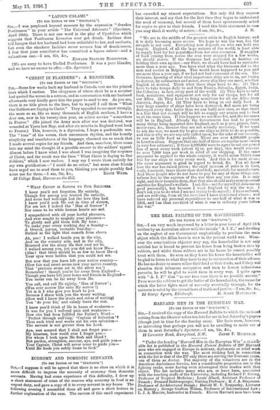ECONOMY AND DOMESTIC SERVANTS.
[To THE EDITOR OF TER "SPECTATOR."] Sin, —I suppose it will be agreed that there is no class on which it is more difficult to impress the necessity of economy than domestic 'servants. Having had some experience of this diffioulty, I drew up .a short statement of some of the reasons why economy in food is an urgent duty, and gave a copy of it to every servant in my house. The .following evening I assembled them all and gave a short lecture in .further explanation of the case. The success of this small experiment
has exceeded my utmost expectations. Not only did they express their interest, and say that for the first time they began to understand the need of economy, but several of them have spontaneously asked for copies to give to their friends. I send this little statement in case you may think it worthy of notice.—I am, Sir, &c., J. M.
" We are in the middle of the greatest crisis in English history, and it is daily becoming more severe. We hope to win the war, but the struggle is not over. Everything now depends on who can hold out longest. England, of all the large nations of the world, is least able to supply food for her population from her own resources. If supplies of food coming from across the seas were stopped for a few weeks. we should starve. If the Germans had succeeded in beating—er holding their own against—our Fleet, we should have had to surrender more than a year ago. You have read what the Germans did to the men and women in Belgium. This would have happened to you and me more than a year ago, if we had not had command of the sea. The Germans, knowing of what vital importance ships are to us, are trying to destroy, by submarines and mines, every ship they can meet, whether English or neutraL Think what these ships have to do : (1) They have to take troops daily to and from France, Salonika, Egypt, India, the Colonies ; in fact, every part of the world. (2) They have to take food, munitions, and equipment not only for our troops, but for all our Allies. (3) They have to bring munitions for all our Allies from America, Japan, &o. (4) They have to bring us our daily food. A very largo number of ships have been destroyed, End more are being destroyed every day, faster than we can build new ones, so that there is a fear that not enough will bo left to supply our armies and to feed us at the same time. If this happens we are done for, and tho Germans will be in England. Already the Government has had to prevent many things being imported into England, such as paper, pianos, fruit. motor-cars, &c., because they are not actually necessary. If we want to win the war, we must try to give our ships as little to do as possible, and this is why we are urgently called upon, for the sake of our country, to use as little food as possible. Therti are over 4,000,000 people in London alone. Suppose that one-half of these arc regular moat-eaters (a very low estimate) ; if those 2,000,000 were to agree to eat one pound less of meat every week (about 1 oz. per day), this would amount to over 7,000 tons per week in relief of our shipping. If the same argument be applied to the whole country, it would moan 70,000 tons less for our ships to carry every week. And this is for meat alone ; the same argument is good in regard to bread, &c. You all know how the war has raised prices ; the chief increase of price is in food, coals, transport, taxes (more than doubled), materials for manufacture. And those people who do not have to pay for any of these things con- tribute less to the expense of the war than any one else. It is only right, and their bounden duty, that they also should make some personal sacrifice for England's welfare. I ask this—not for myself (it does use an good personally), but because I want England to win the war. I don't ask you to do what I am not trying to do myself ; I have suffered, and am suffering, from all the increases I have mentioned above ; and have reduced my personal expenditure to ono-half of what it was in 1915, and leas than one-third of what it was in ordinary years before the war."


























 Previous page
Previous page